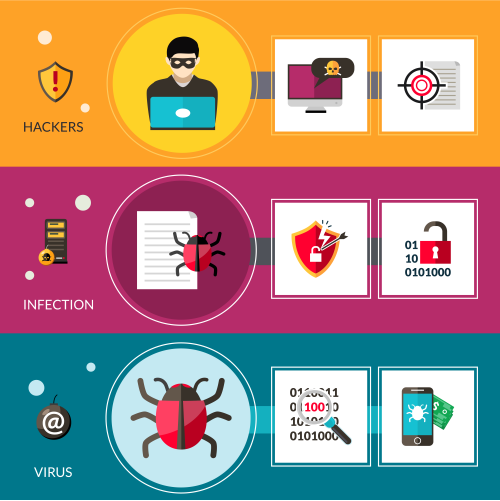Infection Support Center
Welcome to Our Computer Infection Support Center
At Vikman Business Solutions, we understand how frustrating it can be when your computer becomes infected with malware, viruses, or other harmful software. Our expert team is here to guide you through identifying, fixing, and preventing computer infections, ensuring your system stays secure.

Common Types of Computer Infections:
-
Viruses
- What They Are: Malicious software that spreads from one computer to another, often causing damage to files, programs, or the system.
- How They Spread: Viruses typically spread through email attachments, infected software downloads, or compromised websites.
-
Ransomware
- What It Is: A type of malware that locks you out of your computer or encrypts your files, demanding payment in exchange for access.
- How It Works: Often delivered through phishing emails or malicious websites. Once executed, it locks files or the entire system.
-
Spyware
- What It Is: Software that secretly monitors your activities and collects personal information without your consent.
- How It Works: Usually installed unknowingly by users through software downloads or malicious websites. It tracks browsing activity, passwords, and other sensitive information.
-
Adware
- What It Is: Software that automatically displays or downloads unwanted advertisements onto your computer.
- How It Works: Adware is often bundled with free software, and while not always harmful, it can severely slow down your computer and cause a poor user experience.
-
Trojans
- What They Are: Malware that masquerades as legitimate software to trick users into downloading and installing it.
- How It Works: Once downloaded, a Trojan can open the door for other types of malwares, steal data, or damage the system.
-
Rootkits
- What They Are: A set of software tools designed to conceal the presence of malicious activity on your system.
- How They Work: Rootkits allow hackers to maintain access to a system while hiding their activities from both users and antivirus software.
-
Worms
- What They Are: A type of malware that replicates itself to spread across networks and computers without needing a host program.
- How They Spread: Worms often spread through emails, file-sharing programs, or unpatched software vulnerabilities.
Signs That Your Computer May Be Infected:
If you notice any of the following symptoms, your computer may be infected with malware:
-
Slower-than-usual performance: If your computer is suddenly running slow or freezing, it could be due to malware consuming system resources.
-
Frequent pop-up ads: An increase in unsolicited ads or intrusive pop-ups is a common sign of adware or other types of infection.
-
Unexplained file changes: If files are disappearing, becoming corrupted, or being renamed without your action, your computer may have been compromised.
-
Constant system crashes or errors: Repeated crashes or error messages are common signs of malware infections like viruses or Trojans.
-
Suspicious activity: If programs are opening, closing, or behaving strangely without your input, it could be a sign that a Trojan or rootkit is present.
-
Unusual network activity: If your internet connection is unusually slow, or if there’s unexplained data usage, it could indicate that your system is being controlled remotely by hackers.
Prevention Services Provided:
We offer specialized Computer Infection Prevention services, including:
-
Comprehensive Malware Scanning.
-
Regular System Maintenance & Updates.
-
Security Audits and Vulnerability Assessments.
-
Employee Security Training for Businesses.
-
Ongoing Technical Support.
FAQ
-
How do I know if I have a virus or malware on my computer?
- Look for signs such as slow performance, pop-up ads, and unexplained changes to files or system behavior. Running a full antivirus scan can confirm if your system is infected.
-
Is it safe to pay a ransom if I get ransomware?
- It’s not recommended to pay the ransom, as there’s no guarantee you’ll get your files back. It’s better to try to remove the infection and restore your files from a backup.
-
Can antivirus software detect all types of malwares?
- While antivirus software can detect most malware, some newer or sophisticated infections (such as rootkits) may evade detection. It’s important to use specialized tools for deeper scanning if needed.